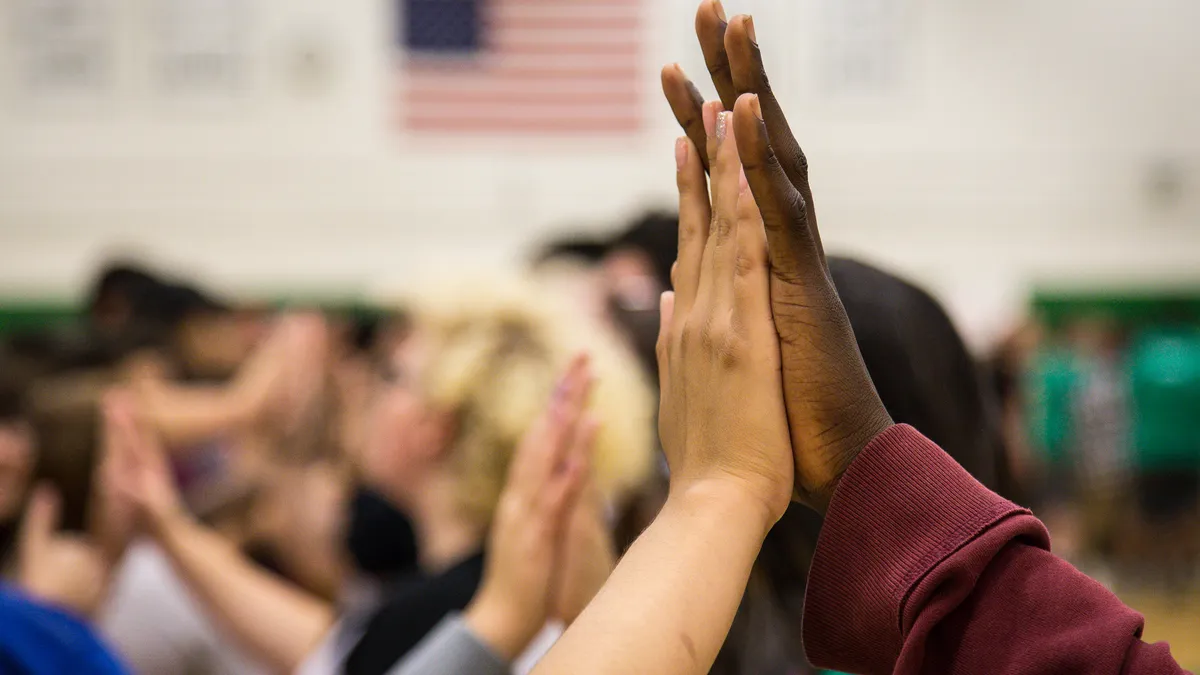Maya Smallwood is an EY Global PAS employee experience leader and EY Americas change & learning solutions leader. Views are the author's own.
The year 2020 has brought a reckoning to our working world, accelerating some trends (like digital transformation), interrupting others (like interconnected, global supply chains) and exposing differences in the experiences of people and organizations further ignited by the COVID-19 pandemic.
While scholars are only starting to study and unpack what this all means, an emerging consensus is that when it comes to the societal injustice and inequity long experienced by Black people in the United States and around the world, it is not a coincidence that their particular experience gained such vast social media traction and resonated with so many people when millions of people were immobilized at home (whether unable to work, or working increasingly long hours) and were confronted with their own existential professional and personal crises, induced by COVID-19.
People witnessed excessive use of force against Black men and women by law enforcement officers. These incidents were captured on video and shared on social media and in news reports against a backdrop of polarizing national and international conversations about race.
As a result, a social movement has expanded to address systemic racism and discrimination that Black communities have long faced. From social media posts to large-scale group demonstrations across the country — and the world — to symbolic and meaningful corporate actions, the movement connected with millions of people.
While the movement inspired people from all generations to speak out, pledge to listen, learn about the issues and take action, many corporate leaders struggle with how to translate this movement into something meaningful within their own organizations. Attitudes and behaviors perpetuated over long periods of time require more than just a desire for change; they require continued, material investments and ongoing examination of existing systems.
At the same time, as the pandemic continues to spike in different regions around the world, organizations and the workforce are grappling with new stresses and pressures from working remotely.
EY and many organizations are reimagining the way they work, doubling down on employee experience. There is a renewed focus on anti-racism and equity while prioritizing diversity and inclusion. However, many other businesses are facing challenges around liquidity and business continuity and, as a result, may focus on those priorities.
In the U.S., the pandemic has had a disproportionate impact on Black people and other underrepresented minority communities. Black employees are contending with elevated risks for COVID-19 infections and deaths and have higher proportional representation within the essential workforce. As many face more familiar challenges of balancing child-rearing and elder care responsibilities, there are layered, dynamic emotional stressors ranging from concerns about encountering law enforcement, to being the face of diversity in corporate environments while simply wanting to focus and perform on the job.
So, how can organizations help ensure Black employees feel supported, whether they choose to declare publicly or not that they themselves are anti-racist?
Fundamentally, it is about recognizing that the experiences of Black professionals may feature distinct complexities even as the entire workforce is navigating unprecedented, challenging conditions.
When recognition is paired with intentional and active experience management, corporate leaders can shift the organization from responding to the social justice movement to supporting the experiences of those materially impacted.
As organizations execute D&I strategies that address unconscious bias, retool businesses and talent processes to address inequity, and embed leadership and team behaviors that will sustain an inclusive culture and workplace where a diverse workforce can thrive, the initial steps organizations can take to positively impact the experience of Black professionals are within reach.
First, listen to understand, using powerful tools for insight. Begin with pulse surveys but leverage more robust listening capabilities mining diverse sources to gauge deeper sentiment, while also analyzing how people connect and influence one another in organizational social networks.
Second, forge connection and engagement to bridge the virtual divide. Digital, mobile-first platforms provide a medium to engage colleagues and professionals once distant, if not peripheral, but also on a much larger scale. New and emerging storytelling platforms that are centrally leveraged by organizations can provide effective windows to bring together all demographics. Such platforms can also provide an opportunity to engage, build awareness and trust, while also creating new and agile ways of working.
Third, mark the moments that matter in employee experience outside of regimented HR transactions in the lifecycle — the "white space" of experience that happens organically for individuals as they integrate work and life, within relationships/teaming contexts, and across physical, technological and cultural aspects of the environment. That's where gaps and barriers to that experience can be removed and interventions customized to suit segments of a diverse workforce. In large and small organizations, data and analytics can identify patterns that enable organizations to proactively tune experiences to deliver expected outcomes.
The visibility the social movement has gained to date in 2020 is a testament to the importance of extending basic human rights to a population that has long experienced unjust and inequitable outcomes. It will not happen overnight, but change can happen through committed actions of people and organizations. Organizations should be guided by the notion that placing "humans at the center" of decision-making will drive long-term, inclusive growth.
In fact, the indomitable novelist Toni Morrison makes a succinct business case for the anti-racist organization. If "the very serious function of racism…is distraction" that "keeps you from doing your work," the post-pandemic working world would do well to be rid of it.
The views reflected in this article are the views of the author and do not necessarily reflect the views of the global EY organization or its member firms.




















